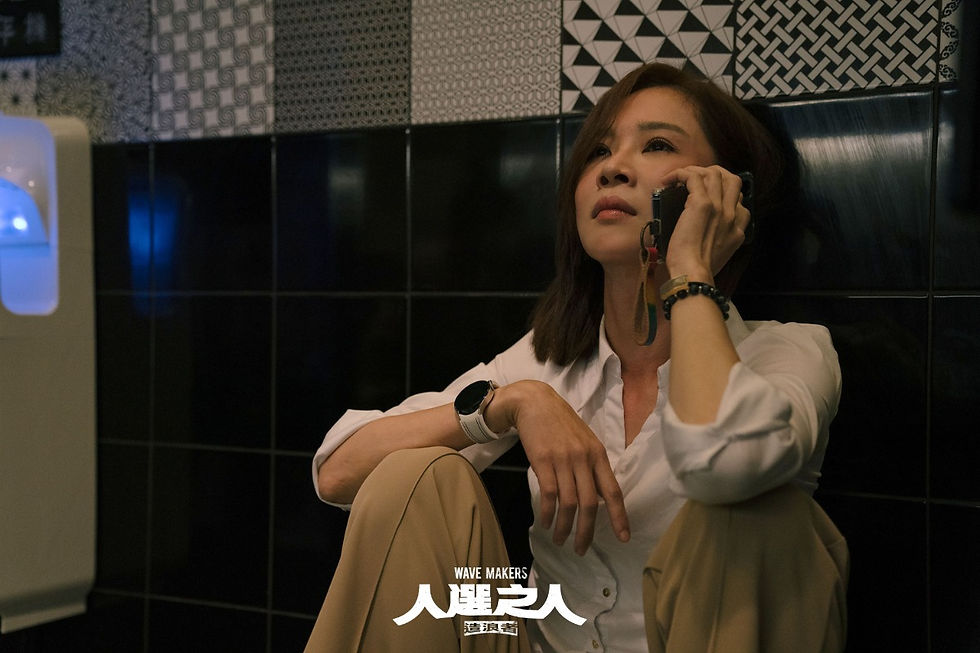NETFLIX SERIES: WAVE MAKERS - Reflections of Power 影集《人選之人—造浪者》
- 辛母羊
- Jun 25, 2023
- 4 min read
Updated: Jul 2, 2023
文|辛母羊
Netflix Series: WAVE MAKERS: https://www.netflix.com/title/81655481
In recent times, sparked by the discriminatory election brochures distributed by students at National Taiwan University, numerous victims of sexual discrimination have come forward in both the political and social spheres. This wave of events has generated various positions, including criticism, introspection, shifting blame, and making excuses. These phenomena resonate with the sharp lines portrayed in the political drama WAVE MAKERS, mirroring the personal experiences of Wang Jing, who plays a character subjected to sexual exploitation by a political party worker. These events are almost reenacted in reality, creating a poignant and ironically accurate portrayal.
Gender consciousness and related themes are currently at the forefront of public discourse. Gender politics has long been a common theme in Taiwanese film, television, and literature, with content creators portraying these issues in a profound manner. From Jack Yao's haunting portrayal of a sinister teacher in the Taiwanese drama DETENTION to Ruby Lin's character confronting harassment in THE ARC OF LIFE, and the meticulous deconstruction of the intricate structure of victim regulation and pressure in WAVE MAKERS. These works not only authentically present the good and evil of Taiwanese political culture but also serve as a clear mirror, revealing the various monsters that exist within power dynamics.
These monsters and evils are universal, transcending borders and time. In 2021, Australia was rocked by scandalous sexual assault cases involving parliament members, and Prime Minister Morrison's ineffective response. Even before that, in response to the #MeToo movement in the West, the Australian Human Rights Commission conducted a national investigation into workplace sexual harassment, funded by the government. However, one must question whether these efforts truly address the problem. Similarly, within the narratives of WAVE MAKERS and other film and television works, we see the portrayal of institutions such as the "Gender Equality Committee." However, in an environment that normalizes or downplays behaviours that exert excessive power and cross boundaries, these channels often serve as mechanical gears, prioritizing the preservation of the system at the expense of sweeping issues under the rug and merely replacing parts. This further compounds the harm inflicted on victims, causing them a secondary injury.
In reality, the submission of countless gender equality applications that disappear without a trace and the public testimonies that are painstakingly shared are heartbreaking. Meanwhile, in film and television works, these stories provide an opportunity for reflection and even imitation for many people, but they are a double-edged sword. While there are nuanced portrayals that deeply move and shock us, there are also gender-stereotyped portrayals that carry a threatening undertone. In many popular narratives, these depictions serve the larger storyline. The question arises: do these stereotypical romantic plotlines that omit the element of "consent" implicitly condone, especially, male transgressions against women?
最早以台大學生的歧視性選舉公報為導火線,到政壇與社會延燒出無數性受害者的自陳。這一浪尖上交錯著批判、反省、卸責、託辭等各種立場,這些現象在在呼應著選舉職人劇《人選之人—造浪者》裡的犀利台詞,猶如飾演受到性剝削黨工的王淨的親身遭遇,幾乎在現實中一一翻演,十分諷刺且錐心(同時又讓人矛盾地為該劇的精準叫好)。
如今在公共討論領域裡,性別意識和相關主題高漲。反映在影視或文學作品裡,性別政治早已非少見的主題,台灣的內容創作者一向有深切的刻畫或演出。台劇版《返校》裡姚淳耀飾演面目猙獰的狼師,《她們創業的那些鳥事》被騷擾的林心如,到《人選之人——造浪者》這樣精心拆解對受害者規訓與施壓的精密結構。《造浪者》不僅是忠實呈現台灣政治文化的善惡,更是一面清澈的照妖鏡,讓權力運作場域的各種妖孽現形。
這些妖與惡是普世的,超越國界、時間而存在著。澳洲在2021年即爆出國會議員在大廈裡性侵醜聞,以及總理莫里森滅火但無濟於事的聲明。早在之前因應西方的#Metoo運動浪潮,澳洲人權委員會在政府資助下展開全國職場性騷擾調查,但真的有解決問題嗎?。就《造浪者》和影視作品敘事裡我們所看到的所謂「性平會」等救濟管道,在將諸多權力施壓、逾越界線的行為「正常化」或淡化的氛圍下,更多的是機械齒輪為了保住運作,而不惜息事寧人而撤換螺絲,更多的是體制對受害者的二度傷害。
現實裡,一紙紙性平申請書的遞出和石沈大海,一字字的公開陳述都是讓人心痛的;而影視作品裡提供了一個反思、甚至對許多人來說是模仿的機會,卻是一把雙面刃。固然有細膩刻畫讓人驚心動魄的,也不免有加劇性別刻板具有威脅性的,在許多通俗敘事裡服務全局,那些省略了「同意」的刻板浪漫情節,是否默許了尤其是男性對女性的踰越?當然,我們可以繼續看劇看電影,但是讓我們要保持清醒和對界線的認知。









Comments